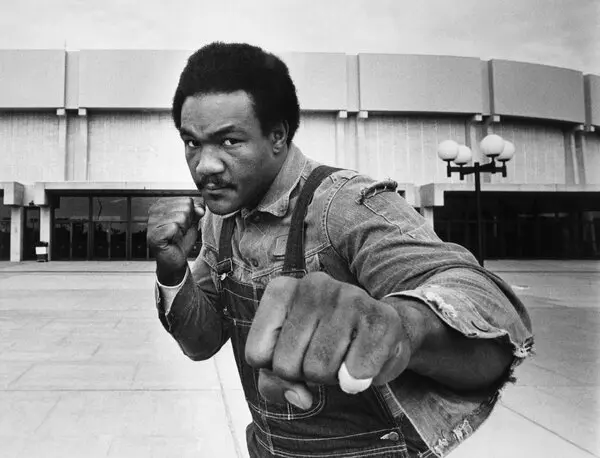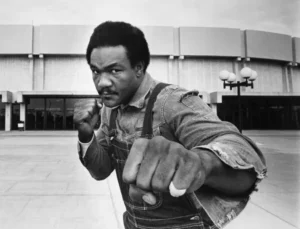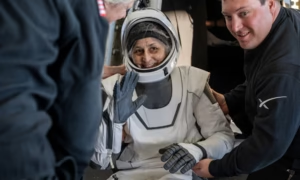Boxing Legend George Foreman Dies at 76: A Look Back at His Remarkable Life and Career.
The world of boxing is mourning the loss of one of its greatest legends, George Foreman, who passed away at the age of 76. Known as “Big George” in the ring, Foreman’s legacy is defined by his incredible achievements, both inside and outside the boxing ring. He was not only a two-time world heavyweight champion but also an Olympic gold medalist and a successful entrepreneur. From his iconic boxing career to his post-retirement ventures, Foreman’s life is a story of redemption, faith, and perseverance.
Early Life and Rise to Glory
Born on January 10, 1949, in Marshall, Texas, George Foreman grew up in a challenging environment. Raised in the segregated American South, Foreman was one of seven children raised by a single mother. Like many young men in his circumstances, he initially struggled to find his path, dropping out of school and even turning to street robberies in his youth.
However, Foreman’s life took a transformative turn when he found solace and purpose in boxing. A pivotal moment came when he joined the Job Corps, a program designed to help young people find work and purpose. There, he was introduced to boxing, and soon, Foreman’s natural athleticism began to shine. His commitment and raw power in the ring quickly set him apart, eventually leading to his Olympic debut.
At just 19 years old, Foreman won the heavyweight gold medal at the 1968 Summer Olympics in Mexico City. His victory was not just a personal achievement but a triumph for African American athletes during a turbulent period in U.S. history. This victory marked the beginning of what would become a legendary career in the world of professional boxing.
The Rise of Big George
After his Olympic success, Foreman turned professional and quickly gained attention with a string of impressive victories. He won 37 consecutive matches, quickly becoming a dominant force in the heavyweight division. Foreman’s punching power was unmatched, earning him a reputation as one of the hardest hitters in boxing history. By the early 1970s, it was clear that Foreman was destined for greatness.
In 1973, Foreman achieved one of the most dominant performances of his career, defeating the previously undefeated Joe Frazier in a stunning victory in Kingston, Jamaica. Foreman knocked Frazier down six times in the first two rounds, a testament to his power and relentless aggression. This victory set the stage for one of the most anticipated boxing matches in history: his showdown with Muhammad Ali.
The Rumble in the Jungle: A Defining Moment
In 1974, Foreman faced Muhammad Ali in what would become known as the “Rumble in the Jungle.” Held in Kinshasa, Zaire (now the Democratic Republic of the Congo), the fight was billed as the ultimate clash between youth and experience, power and strategy. Foreman, the younger, stronger, and more aggressive of the two, was heavily favored to win. At the time, many believed that Ali, who had been stripped of his title for refusing to serve in the Vietnam War, was past his prime and would be no match for Foreman.
Foreman himself reflected on the fight years later, admitting that he was confident in his victory. “Oh, he’s not going to last one round,” Foreman recalled the experts predicting before the match. Despite this overwhelming confidence, Foreman was in for an unexpected turn of events.
Ali, known for his cunning and psychological tactics, employed the now-famous “rope-a-dope” strategy. He leaned against the ropes, absorbing Foreman’s powerful punches while allowing Foreman to tire himself out. Foreman, known for his aggressive style, was unable to sustain his energy, and in the eighth round, Ali struck. He unleashed a flurry of punches that led to Foreman’s defeat by knockout.
It was a shocking turn of events and a major upset in the world of boxing. For Foreman, it was a devastating loss. Yet, in hindsight, he later described it as one of the best things that ever happened to him, as it led to a profound transformation in his life.
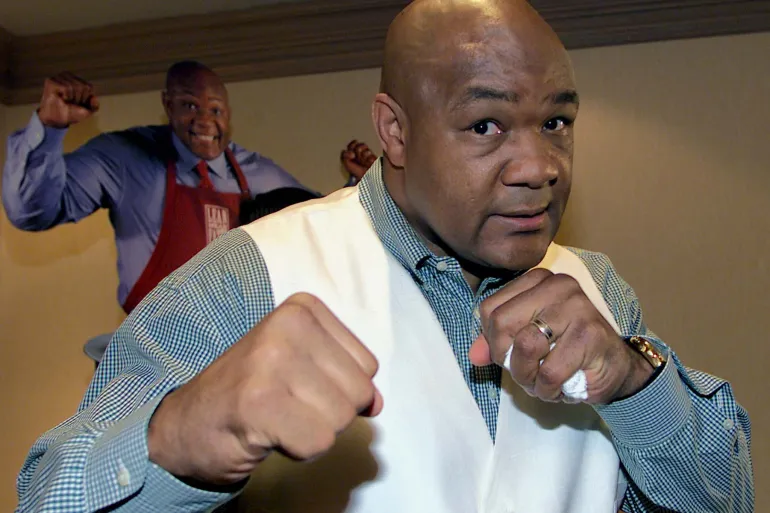
Life After Boxing: Faith and Redemption
After his defeat to Ali, Foreman took a step back from boxing. He retired in 1977, choosing to focus on a new calling: preaching. He became an ordained minister and founded the Church of the Lord Jesus Christ in Houston, Texas. In his spiritual journey, Foreman found peace and a new sense of purpose, spreading his message of faith and redemption. His transition from the ruthless world of boxing to the humble life of a preacher was a reflection of his desire for a change of direction after the heartbreak of his loss to Ali.
“I say to them, ‘If one of us goes up, then we all go up together, and if one goes down, we all go down together!'” Foreman explained on his website, emphasizing the importance of unity and support within his family and community.
Foreman’s new life as a preacher began modestly, starting with small gatherings and street corner services. Over time, his church grew, and he built a larger congregation. Foreman’s journey from a feared boxer to a devoted preacher highlighted his ability to reinvent himself and embrace a new path with the same intensity and commitment that had defined his boxing career.
Return to the Ring: The Oldest Heavyweight Champion
In 1987, Foreman made an unexpected return to the boxing ring at the age of 38. He came out of retirement not for the thrill of competition but to raise money for a youth center he had founded. Foreman’s return to the sport was met with skepticism, as many wondered if the former champion still had the skills and stamina to compete at the highest level. However, Foreman quickly proved his doubters wrong, winning 24 consecutive matches before facing the undefeated Evander Holyfield in 1991. Foreman lost the bout, but his resilience and determination were undeniable.
In 1994, at the age of 45, Foreman achieved the unthinkable: he became the oldest heavyweight champion in history. In a dramatic fight against the undefeated Michael Moorer, Foreman knocked out his opponent in the 10th round to claim the WBA heavyweight title. It was a stunning victory that solidified his place in boxing history and earned him a new wave of admiration.
The George Foreman Grill: A New Legacy
While Foreman’s boxing accomplishments were legendary, his success was not limited to the ring. In 1994, shortly after becoming the oldest heavyweight champion, Foreman signed a deal with the manufacturers of a new product: the George Foreman Grill. The grill, marketed as the “Lean Mean Grilling Machine,” became an instant success and became one of the most recognizable kitchen appliances in America. Foreman’s endorsement of the product turned into a lucrative venture, making him a household name in a way that surpassed his boxing earnings.
The grill’s success is a testament to Foreman’s business acumen and ability to reinvent himself outside of boxing. Over the years, millions of units were sold, and Foreman earned millions from the product’s sales, surpassing even his earnings from his storied boxing career.
A Family Man
Throughout his life, Foreman remained deeply committed to his family. He was married five times and had a total of 12 children, including five sons who were all named George. In interviews, Foreman explained that he gave his sons the same name so they would always have something in common and remain united as a family. He was a loving father, a proud grandfather, and a protector of his family’s legacy. His children were often involved in his various ventures, and Foreman took pride in instilling his values of discipline, faith, and hard work in them.
The Legacy of a Boxing Icon
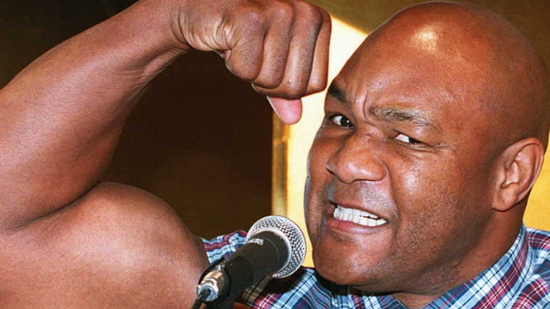
As news of his passing spread, tributes poured in from all corners of the boxing world. Former world heavyweight champion Mike Tyson paid his respects, saying that Foreman’s “contribution to boxing and beyond will never be forgotten.” The Ring magazine, often regarded as the “Bible of Boxing,” hailed Foreman as “one of the greatest heavyweights of all time,” adding that he would “be remembered as an icon of the sport forever.”
Foreman’s legacy is built on a combination of raw power, resilience, and the ability to adapt and overcome adversity. His career in the ring, his transformation into a preacher, and his success as an entrepreneur all serve as testaments to his versatility and determination. Foreman’s impact on boxing and beyond will resonate for generations to come.
George Foreman may be gone, but his legacy will live on, not only as one of the greatest fighters in history but also as a man who transformed his life and made a profound impact on the world. His story is a reminder that with faith, resilience, and perseverance, it is possible to overcome any obstacle and leave a lasting mark on the world.

